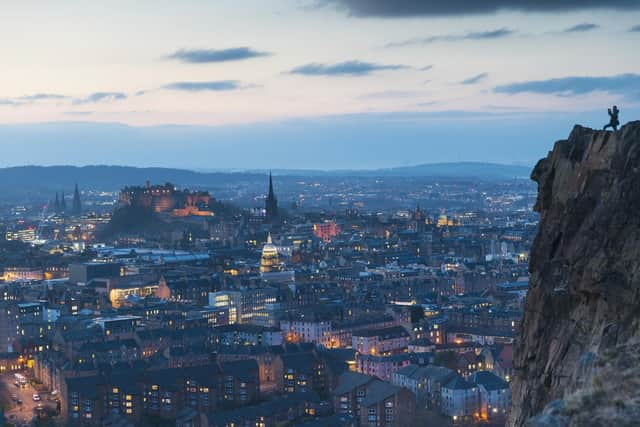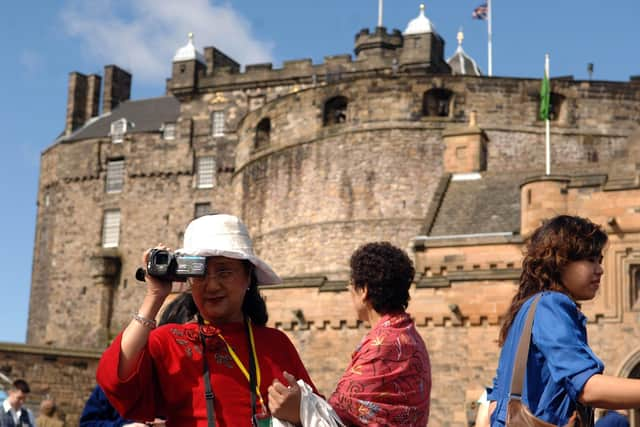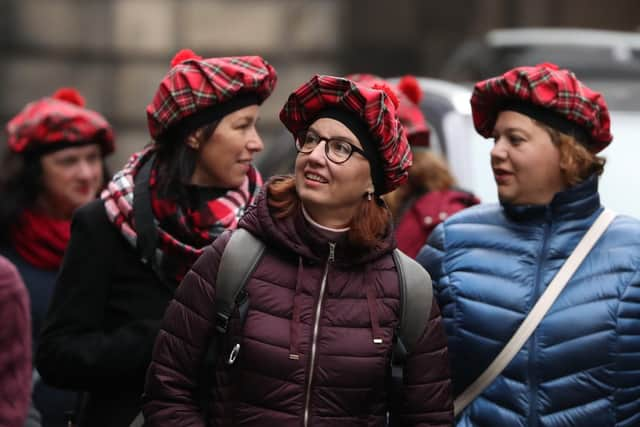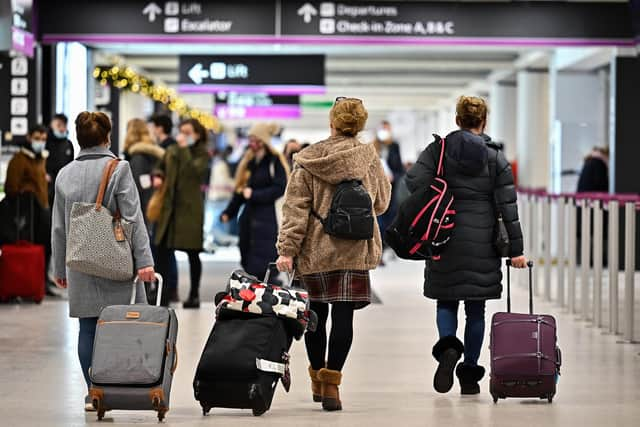Exclusive:Edinburgh’s tourist tax risks creating ‘negative and unwelcoming’ image of Scotland, industry leaders warn
and live on Freeview channel 276
Industry leaders have warned that the introduction of a tourist tax in Edinburgh risks damaging Scotland’s image and reputation as a welcoming destination for international travellers.
Organisations representing thousands of businesses have raised concerns about a proposed visitor levy sparking “negative sentiment” about Edinburgh around the world.
Advertisement
Hide AdAdvertisement
Hide AdTourism chiefs in the city are also worried that Scots could be deterred from spending a night in the Scottish capital if they are hit with an additional charge which is not imposed in other parts of the country.


Industry chiefs have raised concerns with the Scottish Parliament that income generated from the proposed levy – which Edinburgh City Council has been actively lobbying for – will simply be used to replace or reduce existing funding which supports the sector.
The Edinburgh Hotels Association, Edinburgh Chamber of Commerce, the Edinburgh Tourism Action Group and Essential Edinburgh have raised wide-ranging concerns with Holyrood over the proposed powers which the government is proposing to give local authorities.
Although there some support for the principle of a levy being introduced, there are demands for the industry to control the “narrative” and warnings about a “very real danger” to Scotland's reputation as a “world-leading tourism destination” if visitor are deterred from coming to the city.
Advertisement
Hide AdAdvertisement
Hide AdConcerns have already emerged from Edinburgh’s festivals that the introduction of the levy could see performers, companies and crews could be "priced out" of staying overnight in the city.


Under the Visitor Levy (Scotland) Bill, which could see the tourist tax up and running by 2026, local authorities would be able to apply an additional charge on stays in overnight accommodation based on a percentage of the bill.
The government has insisted all money raised must be “reinvested in facilities and services for, or used by, by visitors”.
Councils would also have to consult local communities, businesses and tourism organisations on their spending plans before introducing the levy.
Advertisement
Hide AdAdvertisement
Hide AdNearly 400 organisations and individuals have lodged submissions with Holyrood's local government committee after it launched a consultation on the proposed levy in the summer.


The city council has suggested that visitors to Edinburgh could face an additional charge of four per cent initially.
The Edinburgh Hotels Association, which says it has “laser-focused aims” that unite more than 60 of the city’s major hotels, has told the parliament that it would “undermine the ability of Edinburgh to provide competitively priced accommodation”.
Chair Neil Ellis said: “Scotland (and the rest of the UK) already scores very low on price competitiveness compared to other destinations due to high levels of tax.
Advertisement
Hide AdAdvertisement
Hide Ad“As well as potentially impacting on our much-needed international visitors, a levy may well have an adverse effect on domestic visitors.


“Overnight stays by residents of Scotland and from the rest of the UK to Edinburgh will be impacted, as UK taxpayers question why they are required to pay yet more tax to stay in their own country.
“There is the very real issue of negative sentiment toward destinations introducing a levy. This should not be underestimated and the introduction of a levy in Edinburgh may impact Scotland’s reputation as a whole.
“The narrative around the world, if and when this is introduced, MUST be controlled with the correct sentiment and the positives about the spending pots explained.
Advertisement
Hide AdAdvertisement
Hide Ad“The levy cannot be allowed to deter visitors and impact Scotland’s reputation as a leading tourism destination. With a very open-ended ability to charge, there is the very real danger this could be the result.”
Edinburgh Chamber of Commerce, which has more than 1000 members, said its support for the levy was “on condition" that the money generated was “reinvested” back into the tourism industry.
Its report for MSPs states: “This scheme is not intended to fill a hole in local authorities’ budgets.
“The way that we discuss the levy, and the way it is communicated, is almost more important to potential visitors’ perceptions of the cost than the actual cost itself.
Advertisement
Hide AdAdvertisement
Hide Ad“If we talk about it as a tax on tourism, to be used in any number of ways, presenting tourism as a negative thing that damages local communities, this will present a negative and unwelcoming image of Scotland.
“However, if we view and present the levy instead as a positive investment in the quality of our welcome and experiences on offer to visitors, and back this up with proper investment in facilities and services which are substantially for or used by visitors, then this can go a long way to offsetting the financial impact on visitors.”
Essential Edinburgh, which already raises annual levies from more than 620 businesses, has told MSPS that all money collected from the levy “must be used to support the needs of tourists and investment in the assets of the city that attract visitors.”
Chief executive Roddy Smith said “Money collected must be subject to very robust governance procedures.
Advertisement
Hide AdAdvertisement
Hide Ad“If the levy introduced is not too great, less than five per cent, then I do not think it will negatively impact on the number of visitors coming to the city.
“However, the levy collected MUST NOT be used to replace reducing council budgets in services that are not related to supporting the visitor economy.
“How the money generated is used is the most crucial element of this process.Through consultation, these must be agreed and adhered to. I would support a narrow list of agreed areas that money can be spent on.“There must not be room for manoeuvre here or an ability for a local authority to deviate from the agreed areas of spend. This is one of the biggest fears of the industry.”
The Edinburgh Tourism Action Group, which represents hotels, attractions, festivals, venues and hospitality businesses, has told the parliament that the visitor levy would have “a significant positive impact on the visitor economy of the city. It also highlighted the need for “continuous, ongoing investment in the destination” to ensure it remained “a compelling, must-see destination.”
Advertisement
Hide AdAdvertisement
Hide AdHowever the group said it was “critical" to ensure that “robust” legislation was put in place to govern the levy and that it was not used as a way of “substituting, reducing or replacing” existing funding.
The Edinburgh World Heritage charity said its own research around Europe had found that visitor levies were “very widespread and demonstrably effective.”
But it stressed the importance of ensuring that “sufficient proceeds” from the new levy were ringfenced for the conservation of the city’s historic environment.
Director Christina Sinclair said: “Amidst the cost-of-living crisis, soaring cost of conservation work, widespread decrease in funding support and increase in deterioration due to climate change, Edinburgh’s historic environment will otherwise markedly decline.
Advertisement
Hide AdAdvertisement
Hide Ad“This will have serious implications not just for national heritage, but the economy and tourism offer.”
Edinburgh City Council's own submission to the parliament states that it was clear that the Scottish capital was the “primary pull factor for the country,” given that it was responsible for nearly two thirds of international visits to Scotland and 20 per cent of domestic visits.
The council insists that there is “no evidence" to suggest that the introduction of an additional charge for accommodation would reduce demand or bookings.
However the council has identified the provision of public toilets and tackling graffiti in the city as two of the main priorities for additional resources generated by the new tax.
Comment Guidelines
National World encourages reader discussion on our stories. User feedback, insights and back-and-forth exchanges add a rich layer of context to reporting. Please review our Community Guidelines before commenting.
